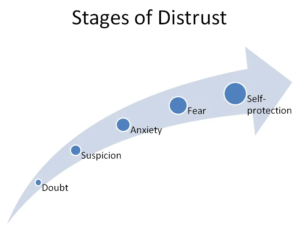By nature I’m a pretty trusting person.
 Under normal circumstances I tend to extend trust to others expecting they will reciprocate in kind. If the other person proves to be untrustworthy, then I’ll dial back the level of trust I place in him/her.
Under normal circumstances I tend to extend trust to others expecting they will reciprocate in kind. If the other person proves to be untrustworthy, then I’ll dial back the level of trust I place in him/her.
In relationships where I’ve experienced distrust, I’ve found it usually isn’t caused by one significant breach of trust (although those are the ones that grab our immediate attention), but rather several smaller instances over time.
A broken promise here, a missed deadline there, and a pattern of unreliable, unethical, incompetent, or uncaring behavior becomes the trend.
Distrust doesn’t happen overnight. It develops progressively through stages, and if we can recognize these stages when we’re in them, we have a chance of addressing the situation before distrust takes root.
1. Doubt – The first stage of distrust begins with doubt. You start to experience a slight uncertainty about someone’s trustworthiness that causes you to pause just a bit. It might be that nagging doubt in the back of your mind that you can’t seem to dismiss, or something just doesn’t feel right about the situation even though you can’t put your finger on it exactly.
2. Suspicion – Doubt, if unresolved, grows into suspicion over time. Suspicion is belief without proof. You’ve started to see a pattern of behavior that may indicate a lack of trust, but you don’t quite have enough proof to make a firm conclusion. Your trust radar is telling you that something is wrong.
 3. Anxiety – The third stage of distrust is anxiety, a feeling of apprehension or uneasiness, that is often manifested physically. When dealing with someone you don’t quite trust, you may may experience nervousness, a rapid heartbeat, anger, a knotted stomach, or even disgust.
3. Anxiety – The third stage of distrust is anxiety, a feeling of apprehension or uneasiness, that is often manifested physically. When dealing with someone you don’t quite trust, you may may experience nervousness, a rapid heartbeat, anger, a knotted stomach, or even disgust.
4. Fear – At this point in a relationship, distrust has risen to the point where you are afraid to show vulnerability. You have experienced repeated breaches of trust and have grown to distrust another person to the point you are afraid for your emotional well-being.
5. Self-protection – As a result of the fear you experienced, you move into a state of self-protection. You put up walls in your relationship to prevent the other person getting close to you. This act of self-preservation reduces your vulnerability, but also cements the state of distrust in the relationship.
Trust is the cord that holds two people together in relationship, and when it’s severed, disconnection occurs. When you can no longer be vulnerable with the other person, you begin to experience different things in your relationship. In his book, Beyond Boundaries – Learning to Trust Again in Relationships, Dr. John Townsend describes several common experiences of damaged trust:
Withdrawal – Instead of acting carefree, which is normal in a trusting relationship, you become more reserved in sharing personal information. You quit taking risks in the relationship because the safety net has been removed. Loneliness or feeling dead or frozen inside is common.
Movement to task – To compensate for the lack of trust in the relationship, you may over-invest yourself in tasks related to hobbies, work, school, church, or other activities. You stay active in other parts of your life because you find it easier to “do” than to “connect.” You shut down the personal part of your relationship with the other person.
Unbalanced “giver” relationships – Townsend points out that it’s common for a person to be the “giver” in all relationships and to avoid “receiving.” Being the giver allows you to remain safe from being vulnerable with another person. You will listen, help, and guide others, but withhold letting others help you. Being the giver also manifests itself in co-dependent relationships.
Bad habits – Trust issues can often lead to problematic behavioral patterns in your life. It’s easy to suppress our emotional feelings by over-eating, drinking too much, or other addictive behaviors.
Distrust can spread through a relationship like a wildfire. What starts as a small ember of doubt can mushroom into a full-on blaze of distrust if we don’t take steps to address it early. The best way to prevent distrust from taking root is to proactively focus on building trust. Trust must be continually developed and nurtured throughout the course of a relationship, not just when it’s been damaged.


























